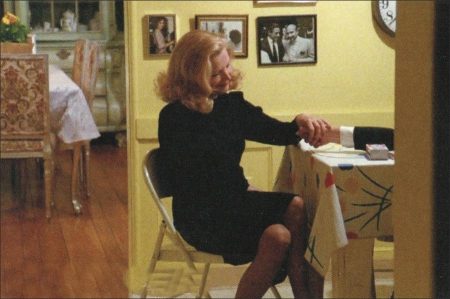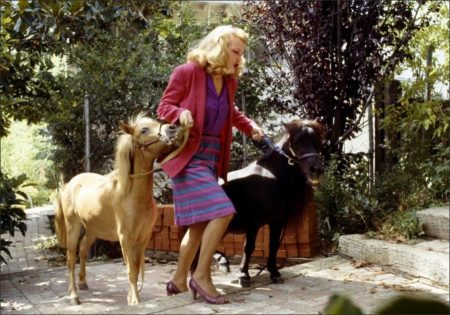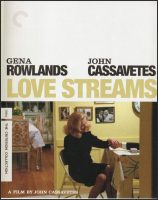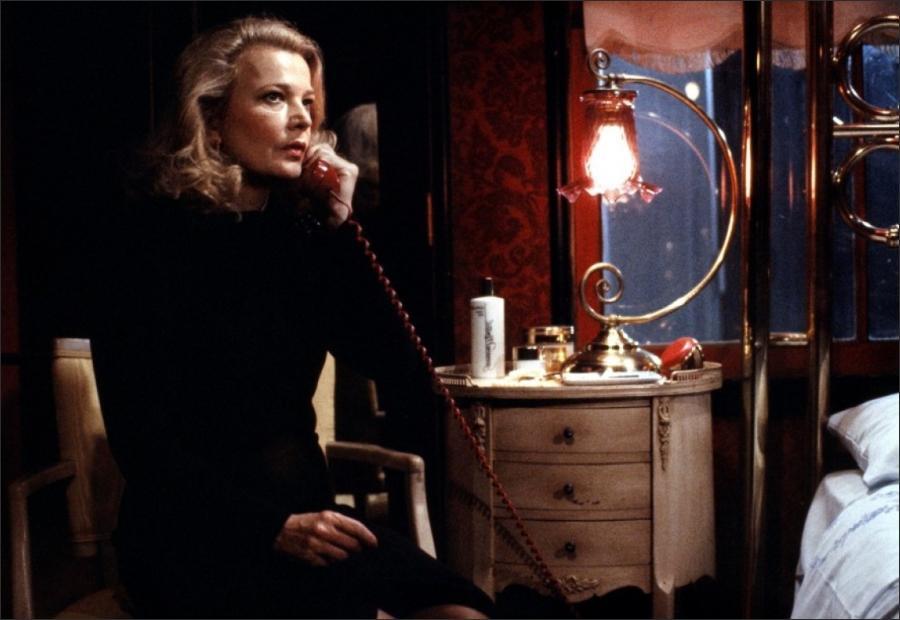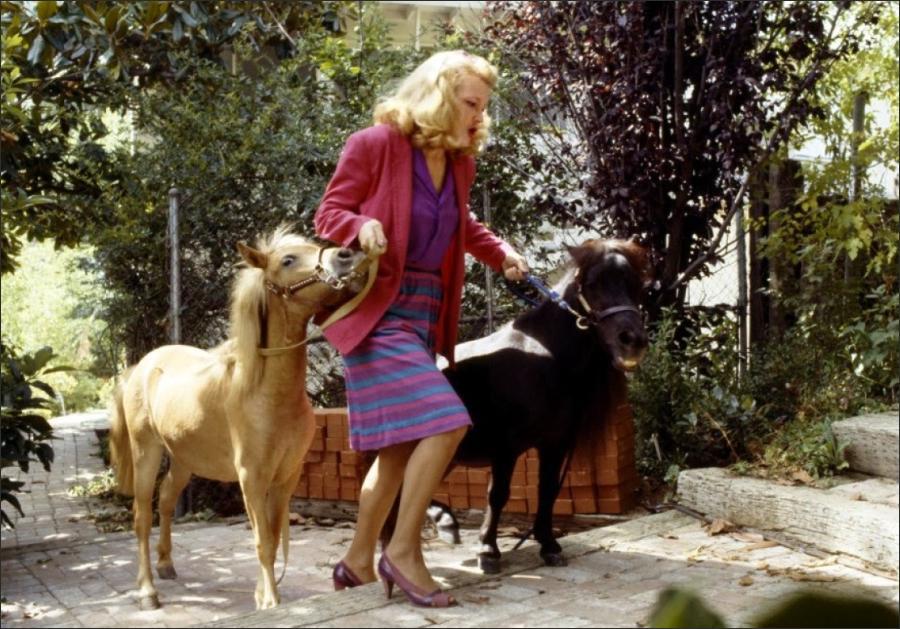Love Streams describes a few days in the life of the writer Robert Harmon and his sister Sarah. The decadent life of Robert is made of alcohol, cigarettes, and short-time relationships with women; women he interviews for a book, he spends a weekend with at a casino or fall in love with for the fun of an evening. Having no constraints, he his unable to be responsible for anything including the care of his son, leaving him alone in an hotel room and teaching the 8-years old boy how to drink.
His life is made of his own phantasms as an artist. His sister is divorcing from her husband because of her exuberant and insane behavior. She scares her daughter Debbie who prefers to stay with her father, a decision that hurts Sarah very deeply and reinforces her nervous breakdown. Most of the movie takes place in the house of Robert. We watch Robert and Sarah struggling with their own lives. As the movie progresses, the house gets empty little by little…
Love Streams is a 1984 American film directed by John Cassavetes that tells the story of a middle-aged brother and sister who find themselves caring for one another after the other loves in their lives abandon them. The film was Cassavetes’ 11th and penultimate film. He later made the more mainstream Big Trouble.
Love Streams is based on the 1980 play of the same name by Ted Allan, but the correlation between the screenplay and the play is minimal. In the stage production, the role of Robert Harmon was played by Jon Voight; Cassavetes took up this role for the film version.
The visual style of the film is decidedly different from Cassavetes’s other works, as it contains no hand-held camera work (which was a trademark of his visual style). Much of it was shot inside Cassavetes’s real-life home.
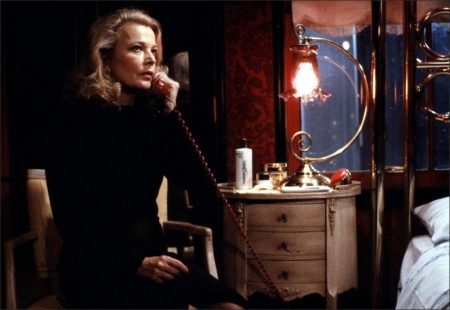
Film Review for Love Streams
John Cassavetes’s “Love Streams” is the kind of movie where a woman brings home two horses, a goat, a duck, some chickens, a dog, and a parrot, and you don’t have the feeling that the screenplay is going for cheap laughs.
In fact, there’s a tightening in your throat as you realize how desperate an act you’re witnessing, and how unhappy a person is getting out of the taxi with all those animals. The menagerie scene occurs rather late in the film, after we’ve already locked into Cassavetes’ method. This is a movie about mad people, and they are going to be acting in crazy ways, but the movie isn’t going to let us off the hook by making them funny or picaresque or even symbolic (as in “King of Hearts”). They are, quite simply, desperate.
The brother, Robert (played by Cassavetes), is a writer who lives up in the Hollywood Hills in one of those houses that looks like Architectural Digest Visits a Motel. He writes trashy novels about bad women. A parade of hookers marches through his life; he gathers them by the taxiload, almost as a hobby, and dismisses them with lots of meaningless words about how he loves them, and how they’re sweethearts and babies and dolls.
The circular drive in front of his house is constantly filled with the cars of the lonely and the desperate. He is an alcoholic who stays up for two or three days at a stretch, as if terrified of missing one single unhappy moment. The sister, Sarah (Gena Rowlands), is as possessive as her brother is evasive. She is in the process of a messy divorce from her husband (Seymour Cassel), and her daughter is in flight from her.
Rowlands thinks that maybe she can buy love: First she buys the animals, later she talks about buying her brother a baby, because that’s what he “needs.” At least Cassavetes and Rowlands can communicate. They share perfect trust, although it is the trust of two people in the same trap. There are other characters in the movie that Cassavetes talks at and around, but not with.
They include a bemused young singer (Diahnne Abbott) who goes out with Cassavetes but looks at him as if he were capable of imploding, and a former wife (Michele Conway) who turns up one day on the doorstep with a small boy and tells him: “This is your son.” The way Cassavetes handles this news is typical of the movie. The woman wonders if maybe he could babysit for a weekend. He says he will. He brings the kid into the house, scares him away, chases him halfway down Laurel Canyon, brings him back, pours him a beer, has a heart-to-heart about “Women, Life and Marriage,” and then asks the kid if he’d like to go to Vegas. Cut to Vegas.
Cassavetes dumps the kid in a hotel room and goes out partying all night. He is incapable of any appropriate response to a situation requiring him to care about another human being. He fills his life with noise, hookers, emergencies and booze to drown out the insistent whisper of duty.
The movie is exasperating, because we never know where we stand or what will happen next. I think that’s one of its strengths: There’s an exhilaration in this rollercoaster ride through scenes that come out of nowhere. This is not a docudrama or a little psychological playlet with a lesson to be learned. It is a raw, spontaneous life, and when we laugh (as in the scene where Cassavetes summons a doctor to the side of the unconscious Rowlands), we wince.
Viewers raised on trained and tame movies may be uncomfortable in the world of Cassavetes; his films are built around lots of talk and the waving of arms and the invoking of the gods. Cassavetes has been making these passionate personal movies for twenty-five years, ever since his “Shadows” helped create American underground movies. His titles include “Minnie and Moskowitz” (in which Rowlands and Cassel got married), “Faces,” “A Woman Under the Influence,” “The Killing of a Chinese Bookie,” “Gloria,” “Opening Night” and “Husbands.” Sometimes (as in “Husbands”) the wild truth-telling approach evaporates into a lot of empty talk and play-acting. In “Love Streams,” it works.
Love Streams (1984)
Directed by: John Cassavetes
Starring: Gena Rowlands, John Cassavetes, Diahnne Abbott, Seymour Cassel, Margaret Abbott, Jakob Shaw, Eddy Donno, Joan Foley, Al Ruban, Xan Cassavetes, Michele Conaway, Dominique Davalos
Screenplay by: Ted Allan
Production Design by: Phedon Papamichael
Cinematography by: Al Ruban
Film Editing by: George C. Villaseñor
Costume Design by: Lydia Manderson, Jennifer Smith-Ashley
Music by: Bo Harwood
MPAA Rating: PG-13 for adult situations / language, violence).
Distributed by: Cannon Films
Release Date: August 24, 1984
Views: 187
